
Kaldıraç Etkisi, Ekim Nazım Kaya’nın girişimcilik üzerine düşüncelerini ve deneyimlerini paylaştığı, pek çok girişimcinin de kendi tecrübeleri ile katkıda bulunduğu crowd-sourced bir kitap. Başka bir açıdan bakarsak, bu kitap Ekim’in diğer girişimcilerle bağlantı kurmak, kendi kamuoyunu yaratmak ve Türk internet girişimciliğinin 1. liginde yer almak için yaptığı bir çalışma. Kitabın içeriğinin yanısıra, Ekim’in diğer yazarları projeye dahil etmek ve kitabı tanıtmak için yaptıklarından da alınacak çok ders var. Ekim Nazım Kaya’nın yazdıklarından aldığım bazı notlar şunlar:
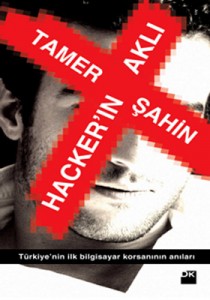
Türkiye’nin internet tarihi ilgimi çektiği için Tamer Şahin’in Hacker’ın Aklı adlı kitabını okudum. Türkiye’de yargılanan ilk hacker olan Tamer Şahin’in gibi ben de ortaokul yıllarımda internet’e girmeye başladım. Önceleri IRC sunucularında chat yaparken, daha sonra internet üzerinden oyun oynamaya ve Counter-Strike üzerine web siteleri yapmaya başladım. Kitapta kendi hayatımdan parçalar buldum. Bana internetin vahşi batıya benzediği günleri hatırlattı. Dial-up ile bağlanıp IRC’ye girmeden önce 3 tane firewall yüklememiz gereken, Windows’un açıkları yüzünden nuke atıp mavi ekran çıkartılan, ssping atıp bilgisayar kilitlenen, trojan yükleyip format atılan yaramazlık günleri geldi aklıma. Kitabı okurken beraber çalışma şansına eriştiğim Umut Gökbayrak ile ilgili bir anıya denk geldim. Sohbetlerimiz sırasında Umut’un Tamer Şahin’i işe aldığını söylediğini hatırladım:
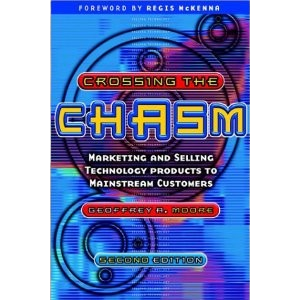
Crossing the Chasm is one of the classic books on marketing and selling technology products to mainstream customers. It was written in 1991 and revised in 1999, but it is still a valuable resource for understanding how technology products get adopted by customers.
The author starts by describing the characteristics of each type of consumer in the technology adoption life cycle: innovators, early adopters, early majority, late majority, and laggards. The main argument of this book is that technology adoption is not continuous and there are cracks in between each of these type of consumers’ adoption. Moreover, the major gap is the one that separates early adopters from early majority, which the author calls “chasm”. The book defines the strategy to cross the chasm and gives examples of companies who took this approach.
From Indie Game: The Movie:
The one major thing that made this possible is the rise of digital distribution. It used to be that retailers had a lot of power over every game creation company because that was the only avenue available to sell games and so nobody was willing to start distributing games digitally because Walmart would get upset at them and they wouldn’t take their products off the shelf and nothing would happen. But Valve changed that when they came up with Steam. They had no loyalties to retail and so they just did it. And then everybody said well, we have to compete with them, and there was this whole flood of XBox Live Arcade, Playstation Network and Wii Ware and it followed suit after that.
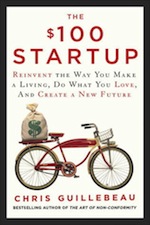
There are two different camps when it comes to startups: Bootstrapped, profitable businesses versus venture-funded companies with big ambitions.
The $100 Startup focuses on startups with low capital requirements that don’t require specialised skills to operate and have more than $50K in yearly profits. It’s a guide for potential entrepreneurs looking for personal freedom.
The author tries to get the reader into “I can do this too” mindset by sharing numerous successful lifestyle business stories. It walks you through each step of starting your lifestyle business, takes you from deciding on what to do to planning to launch, from tactics to increase profits to franchising your business.
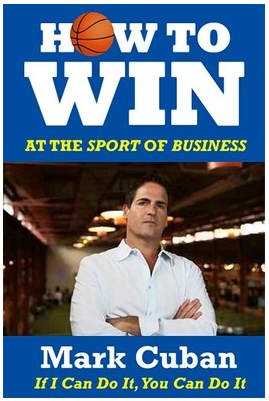
How To Win at The Sport Of Business is Mark Cuban’s book in which he chronicles his life experiences in business and sports. It starts with Mark Cuban’s story, how he started as a salesman at Your Business Software and started a company called MicroSolutions after getting fired. Later parts of the book focus on the lessons he learned along the way and his advice to entrepreneurs. Here are some quotes from the book:
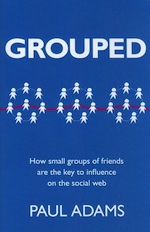
Grouped is a book by Paul Adams on social interactions. It explains how we’re connected to each other, how we communicate with each other and how we influence each other. Using research findings on social interactions, Paul Adams provides actionable items for marketing people on how to communicate their brands using social networks. Here are some interesting bits from the book:
- We communicate with the same 5 to 10 people 80 percent of the time.
- Products that are visible and accessible will be talked about more. Giving people the full product to try can lead to a 20 percent increase in conversations about that product.
- A researcher at Microsoft analyzed 30 billion instant messaging conversations on MSN and concluded that, on average, we are all connected through 6.6 people.
- On average, people have 160 friends on Facebook yet communicate directly with only four to six of them. People with more than 500 friends on Facebook often have a hard time figuring out who some of the people are.
- In a study of 74 milion tweets, only a few dozen generated a thousand retweets. Twitter users with the most followers do not necessarily have the greatest number of retweets or mentions. Instead of looking for overly influential people, businesses should look for regular people who are likely to be interested in what they have to say. Targeting large numbers of these people is more likely to spread ideas than trying to find a small number of influential individuals.
- People eating with one other person eat 35 percent more than they eat at home. People eating in a party of four eat 75 percent more. If your friends are happy, you’re more likely to be happy.
- Research on amazon.com found that people don’t give things objective reviews and ratings; they tend to give the same ratings as other people have given before them.
- If someone gives us somethings, we have a natural desire to give something in return at some point in the future.
- When faced with many choices, people often can’t make a decision and walk away from all the choices. When P&G reduced the number of Head & Shoulders products from 26 to 15, they saw a 10 percent increase in sales.
- When you add a new product line, remove an older one. Apple basically only sells four things: Macs, iPods, iPads and iPhones.
- People are much more likely to vote for the first candidate on the ballot than someone in the middle or at the end because they are primed to think of a list of people as a leaderboard.
- People are much more likely to buy meat that is labeled 85 percent lean than meat that is labeled 15 percent fat.
- People tend to avoid extremes and make choices that are intermediate between what they need at a minimum and what they can possibly spend at a maximum.
Overall it’s a fantastic read full of interesting research findings that are actionable.
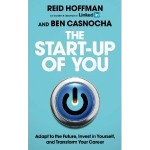
Reid Hoffman’s The Start-up Of You is a book on careers. He makes analogies between startup principles and careers, and explains how one can use these principles in their career. In this book, you’ll also find stories and pivot examples from companies such as Netflix, Flickr, Zappos, Square, Starbucks, Pixar and PayPal.
Here are the bits that I’ve found interesting:
- If you’re not growing, you’re contracting. If you’re not moving forward, you’re moving backward.
- If you try to be the best at everything and better than everyone, you’ll be best at nothing and better than no one.
- Go where there’s fast growth, because fast growth creates all opportunities. Work in a market with natural momentum. Ride the big waves.
- Think two steps ahead. A goal that can be achieved in a single step is probably not very meaningful or ambitious.
- A good Plan A is one that offers flexibility to pivot to a range of possible Plan B’s.
- Relationships matter because the people you spend time with shape who you are and who you become. The fastest way to change yourself is to hang out with people who are already the way you want to be.
- 70 percent of Americans meet their spouses through someone they know.
- Humans should be able to maintain relationships with no more than roughly 150 people.
- I have never funded a company directly from a cold solicitation and my guess is I never will.
- Great opportunities almost never fit your schedule.
- Entrepreneurs strategically pursue only those opportunities with enough upside to justify the possible downside.
- If something worthwhile will be riskier in five years than it is now, be more aggressive about taking it on now.
Overall, careers is not the most interesting subject. It was a short and enjoyable read, however, don’t expect to find any secret formulas regarding your career.
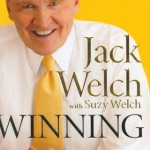
They say don’t judge a book by its cover, but the cover of this book sets the right expectations. It mostly contains business advice for people in suites and ties. Nevertheless, here are some bits that I’ve found useful:
Attitude
- The world generally favors people who are energetic and extroverted. People with positive energy are generally extroverted and optimistic.
- It is very, very hard to get ahead without being a positive person because, very simply, no one likes to work under or near a dark cloud. Even if the “cloud” is very smart.
- People with passion tend to be passionate about everything.
Career Advice

Losing My Virginity is Richard Branson’s autobiography. It depicts Branson’s life in chronological order, starting with his school years and Student magazine days. It continues with Virgin Mail Order business, setting up Virgin Record Shops and a recording studio, and eventually signing up artists to create a record label. Later parts of the book focus on his airline business and the competition between British Airways and Virgin Atlantic.
Branson’s energy reflects in his writing, he starts the book with an exciting hot-air balloon adventure and knows how to engage the reader. There are some lessons to be learned from Richard Branson:









